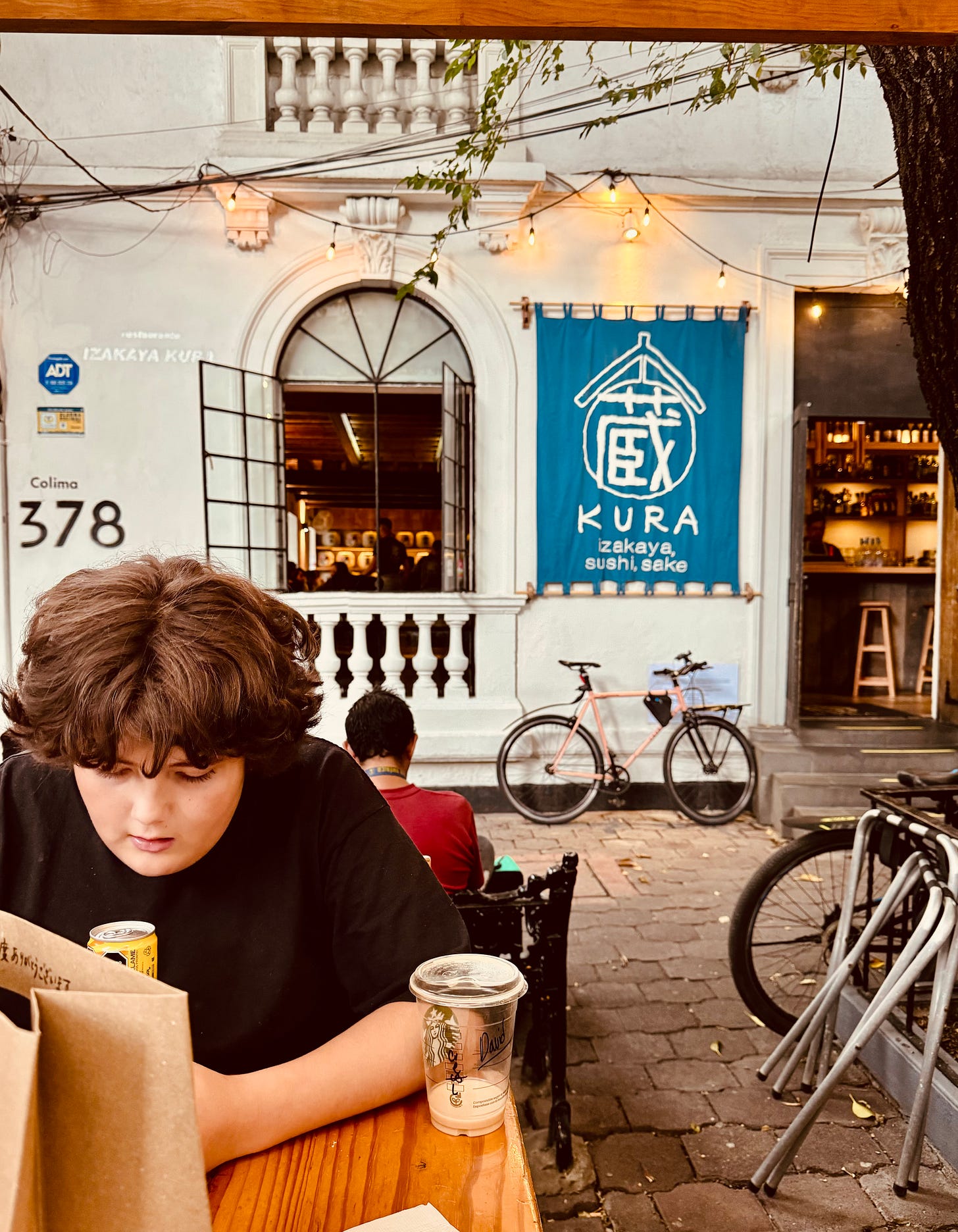Last week, my son’s friend, Michael (13), who lives in another state, called him to say he wanted to un-alive himself.
The boys play video games together, with the third leg of the friendship-tripod, Jack (13). The boys live in various towns across the US. Come from different experiences, ethnicities, economics and geographies. They have known each other for two years and manage time zones, parental curfews and restrictions, and yell at each other through their screens while gaming, in a way that is their currency, their connection, their community.
I don’t entirely understand it, but I don’t have to either. It’s theirs.
I say hello to Michael and Jack when I drop off an egg sandwich in Raffi’s (13) room, a dark hole of a room, set off by blinking LED strips along the walls. It’s more like a NYC grunge club from the 90’s than a boy’s bedroom, booby-trapped with empty soda cans and discarded gas station bags. Plates, dismembered from my kitchen, are stacked on the top of his mini-fridge. I make him clean the thing every week, but you would never know it. It accrues the same level of hoard every week.
Michael and Jack always pop up with a Hi when I walk in with a cheese burger, or will launch into a conversation about the game they are playing, the weather in their town. If dinner is especially good, Raffi will brag to them about what he is eating. They are gregarious boys who I suspect, like Raffi, strruggle to make friends around them. This is their work-around.
On this night, Michael called Raffi to tell him.
The day had gone badly. Michael had a fight with his stepmom, and she and his dad said he couldn’t see his younger brother (10) at their house anymore. This gutted him. Michael is living with his grandpa. Put out from the family home. I suspect all he wants is to get back to his dad’s house. I am not privy to all that happened to have him kicked out of his house, but I know his mom died. And I know he carries all that, and his dad’s new family, and I bet he has a lot of feelings about it.
Grandpa is not a feelings guy. He is an old-school parent. He is physical with Michael. His punishments are quick and stern. There is no explaining. No talking. No listening. Grandpa feels like Michael is out of hand and threatens him often with residential treatment facilities, although I suspect that’s a vague threat they can’t afford. Michael has autism. He misses his mother. He wishes things were different. Every time he tries to do something to change the situation, he messes it up worse. He is not an angel. He considers his options and feels there aren’t many.
“I’m completely alone,” he tells me.
He told Raffi that he had been in “a deep depression for weeks” something that strikes me as amazing that he is able to know that about himself and communicate openly to a peer. I am equally impressed Raffi understood the magnitude of what Michael told him.
Raffi came into my bedroom, holding his phone. I was writing on my side of the bed (David is traveling) and he did the anoying thing he usually does when I am alone in bed, which is to get a little momentum and fling himself hard onto the bed, so that I pop up like a kernel of corn. The higher the better. This annoys me to no end, and tickles him to no end.
This time, he barely thumped in next to me, stuck the phone in my face and said: Talk to Michael.
We talked, the three of us, on speaker phone. For a long time. Mostly I listened and asked questions. And Raffi got figety and left and came back and left again. Michael kept talking.
When we think of depression, we often think of something un-mistakeable, low energy, in bed all day, morose, tired, crying, unable to eat, listless, but in teen boys depression often presents as something else - irritability and frustration, risk-taking, and sometimes, aggression.
That Michael was able to tell Raffi he had been in depression for weeks signaled that he had been through some therapy, or been given the words to describe his feelings, or just had an innate handle on, at least some of, his feelings. Boys, generally, are not as likely to speak to us in this kind of emotionally-connected language, like “I feel sad.” Probably because we don’t encourage them to.
Still, we can’t have young men raging at everyone.
I often have to remind Raffi that even though he is a kid, he doesn’t look like one. He’s big and when he gets aggressive and angry, people don’t see a little kid having a meltdown from being over-stressed. They don’t engage in empathy. They see a grown man being dangerous. They see someone that needs to be contained, jailed, send to juvie or residential treatment. They see someone “bad.” This is simply the reality, who we are as a culture - we stay on the surface. We don’t dig deep enough into the why of how someone is behaving.
These boys are sensitive, like bombs.
The depression becomes something they have to act on, and we as a community have to handle. Those feelings have to go somewhere. And if they can’t go out into the world, they stay inside the kid as depression. Or they are unleashed on us - it is not surprising that many school shooters are severely depressed teen boys (along with having mental illnesses, paranoia and, access to fire arms) - and want to take themselves out as aggressively and as performatively as they can.
It is the ultimate way to punish us for not seeing them.
Michael struggles for someone to see him.
He gets into his dark hole and he holds it all in until he can’t take it anymore, and it’s scary and big and desperate, and his folks shut him down, and punish, and take away things that help him regulate and socialize, like his devices, which is where his friends are, where his supports are. They withdraw love and affection when he is acting like an asshole, and this seems like exactly the thing to do in the traditional parenting play book - don’t reward bad behavior, right?
Except this negates something more important: You can’t punish and reward people out of behaviors because sometimes they are not able to control it. Kids always do better when they are able to do better, same with grown-up people. If they aren’t coping well, it’s likely because they can’t cope, not that they refuse to.
We can’t punish kids out of depression, trauma, mental illness or having lots of ACES. Their feelings, their histories, their deficits will come out one way or the other. No amount of removing phones, stripping them of privileges, is going to pull a kid out of his saddness that comes across like rage.
Boys may not use emotional language like, ‘I feel sad,’” Dr. Lauren Teverbaugh, pediatrician and child psychiatrist at Tulane University in New Orleans says in an article for NBC News.
“But when they’re playing their video games together, or they’re on the basketball court just goofing around, that’s engagement. That’s social interaction. That’s them being able to feel connected.”
And it shows in their IRL relationships.
I know that Raffi is able to talk through his feelings with me while we watch The Walking Dead. If he has a bad day, you can find us laying in his bed, in the dark, talking katanas and zombie-killing strategies while we re-watch favorite episodes. In between, he shares his feelings. Maybe I share mine. We don’t stop until there is some kind of re-connection.
This week Jack - one of the three friends - is having a birthday and Raffi made me drive him to the post office to send him a package filled with an extra computer graphics card he had lying around, a game his family can’t afford to purchase for him, and an envelope of tiny penises that Raffi drew himself and painstakingly cut out with scissors.
“Hope he doesn’t open this in front of his parents” he jokes, pleased at his own mischief-making.
“Don’t worry, I’ll warn him. I don’t want him to get in trouble.”
I marvel at the friendship of these three boys. At least two of them have autism. At least two of them have gone through some hard shit. Two of them have bonded over the death of their mothers. One of them lives in a rural town with shitty internet with just over 500 people, and another in a city with millions, the other in a grassy suburb. There are plans to meet at some point in the future, but even if they don’t, it might not matter.
Michael, Raffi and Jack are all good today. Safe.
I can hear Raffi laughing with them as I write this last paragraph. I am emboldened and proud that one boy felt comfortable enough to openly share his roughest moments, and the other was able to hear that and get him through. All Michael needed was to be heard and seen.
Let’s be good to each other. - Kim








I feel this, Kim. Every single word. My 19 year old has had major depression since 13 or 14 (and Level 1 autism, ADHD, and anxiety). They tried to overdose in January. The most terrifying thing I’ve ever experienced. I’ve written a couple of poems about, but not anything extensive. I needed some space between the event and writing. I embrace everything you’ve shared here. This was their birthday message to me on 2.26. “Happy birthday. Thank you for not giving up on me even when I gave up on myself. I love you” ❤️
Thank you, Kim! On so many levels. What a beautiful example you gave to your son and his friends on how to show up for each other.